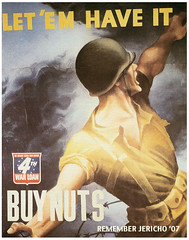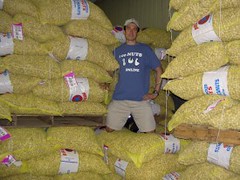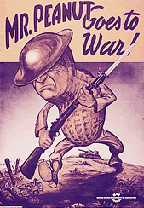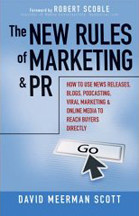Forbes recently ran a pick-up story that called it what we called it days ago: the largest viewer protest in television history. With well over 1,000 registered members at Jericho Rally Point, more than 80,000 petition signatures, and about 19,000 pounds of nuts shipped to CBS by NutsOnline alone, it is quickly becoming the largest social media protest in history.
On Tuesday, the increasingly structured Jericho fanbase is poised to move their message into the mainstream whether news outlets pick up their story or not. They are running a full-page ad in Variety magazine. The advertisement, one of several the fanbase will buy, will drive visitors to Bring Jericho Back, a Web site that includes links to relevant sites and contact numbers at CBS.
The ad, which includes story clips from The Los Angeles Times and WebProNews.com, will be accompanied by a banner on the Variety Web site. But the fans won't stop there. They are already raising money to purchase another ad in The Hollywood Reporter and shopping bigger publications.
Such ads will no doubt rally even more to their cause, helping it reach the tipping point when a movement becomes mainstream. Rumblings across the Internet hint that may happen soon for Jericho. Message board comments on unrelated sites demonstrate people who never watched the show are anxious to join.
"I want to be part of the greatest network protest in history," they say.
While Find The Boots suggests that CBS ride the viral marketing storm a little longer, I remain unconvinced this is a prudent choice for the network. Leaving mainstream media like Newsday with nothing more than rumors that Jericho "might" make next season's fall lineup or be wrapped up in two hour movie only motivates the Jericho fan base.
The longer CBS waits to respond with anything definitive, the more likely it will have to address its decision to a mob of angry fans outside CBS headquarters. In such a scenario, competing stations would have no choice but to cover the story, solidifying CBS Entertainment President Nina Tassler's call to cancel the show as the worst decision in network history (even if she reverses it). Such a label would be unforgettable, given that the public tends to be unforgiving of executives who respond too little, too late.
Sure, some people think I'm giving too much credit to the fans; even one of my best "social media" friends said I was nuts to give the Jericho story so much attention. I disagree, but only because I have the advantage of understanding what this might mean.
Having had contact with one of the two Jericho fan base leaders, I'm convinced things will get worse before they get better unless CBS comes to the table soon. The once makeshift fanbase has developed into a well-structured movement with two leaders, 10 commanders, several dozen lieutenants, and thousands of fans. In the last few days, they've added international commanders as well.
The two leaders have taken time off from work, dedicating almost 18 hours per day to the cause. The rest of the command base dedicates anywhere from 4-12 hours a day, every day. Most of them meet on the CBS Jericho forums, which demonstrates how once a network creates a social community, it's not easy to undo.
Since the beginning, they've also picked up several members with lobbying backgrounds and marketing knowledge. And, they are occasionally given tips from members of the media, like Jericho fan and popular BlogTalkRadio personality Shaun O'Mac. In fact, the NUTS campaign origination is credited to his first show covering the story.
According to Schumi07, one of the two designated command leaders for Jericho fans at Jericho Lives, the NUTS campaign means much more than a historic viral marketing effort. It represents "millions of uncounted fans that the Nielsen ratings system does not accurately represent."
It also reveals how much heart these fans really have. When asked what was the biggest surprise since the campaign began, Schumi07 mentioned several, including her rise to a leadership position.
"I'm surprised I'm one of the two leaders because I just wanted my TV show back ... I can't speak for everyone, but the entire core command probably feels the same. None of us have never fought for a TV show before," said Schumi07. "The other surprise is that Nina Tassler responded to our campaign within 48 hours. We know Nina Tassler likes the show."
Schumi07 added that she is most amazed by the dedication of the command group and the fans. Even on iTunes, they are winning. After a single request, the season finale of Jericho moved from 87 to 43. When she looked this morning, it had climbed, and continues to climb, even higher.
Still wondering why I find this fascinating? Jericho fans have raised the bar on social media mobilization. So if you're in business, it's something worth watching because next time it might not be a show that customers decide to stand behind.

On Tuesday, the increasingly structured Jericho fanbase is poised to move their message into the mainstream whether news outlets pick up their story or not. They are running a full-page ad in Variety magazine. The advertisement, one of several the fanbase will buy, will drive visitors to Bring Jericho Back, a Web site that includes links to relevant sites and contact numbers at CBS.
The ad, which includes story clips from The Los Angeles Times and WebProNews.com, will be accompanied by a banner on the Variety Web site. But the fans won't stop there. They are already raising money to purchase another ad in The Hollywood Reporter and shopping bigger publications.
Such ads will no doubt rally even more to their cause, helping it reach the tipping point when a movement becomes mainstream. Rumblings across the Internet hint that may happen soon for Jericho. Message board comments on unrelated sites demonstrate people who never watched the show are anxious to join.
"I want to be part of the greatest network protest in history," they say.
While Find The Boots suggests that CBS ride the viral marketing storm a little longer, I remain unconvinced this is a prudent choice for the network. Leaving mainstream media like Newsday with nothing more than rumors that Jericho "might" make next season's fall lineup or be wrapped up in two hour movie only motivates the Jericho fan base.
The longer CBS waits to respond with anything definitive, the more likely it will have to address its decision to a mob of angry fans outside CBS headquarters. In such a scenario, competing stations would have no choice but to cover the story, solidifying CBS Entertainment President Nina Tassler's call to cancel the show as the worst decision in network history (even if she reverses it). Such a label would be unforgettable, given that the public tends to be unforgiving of executives who respond too little, too late.
Sure, some people think I'm giving too much credit to the fans; even one of my best "social media" friends said I was nuts to give the Jericho story so much attention. I disagree, but only because I have the advantage of understanding what this might mean.
Having had contact with one of the two Jericho fan base leaders, I'm convinced things will get worse before they get better unless CBS comes to the table soon. The once makeshift fanbase has developed into a well-structured movement with two leaders, 10 commanders, several dozen lieutenants, and thousands of fans. In the last few days, they've added international commanders as well.
The two leaders have taken time off from work, dedicating almost 18 hours per day to the cause. The rest of the command base dedicates anywhere from 4-12 hours a day, every day. Most of them meet on the CBS Jericho forums, which demonstrates how once a network creates a social community, it's not easy to undo.
Since the beginning, they've also picked up several members with lobbying backgrounds and marketing knowledge. And, they are occasionally given tips from members of the media, like Jericho fan and popular BlogTalkRadio personality Shaun O'Mac. In fact, the NUTS campaign origination is credited to his first show covering the story.
According to Schumi07, one of the two designated command leaders for Jericho fans at Jericho Lives, the NUTS campaign means much more than a historic viral marketing effort. It represents "millions of uncounted fans that the Nielsen ratings system does not accurately represent."
It also reveals how much heart these fans really have. When asked what was the biggest surprise since the campaign began, Schumi07 mentioned several, including her rise to a leadership position.
"I'm surprised I'm one of the two leaders because I just wanted my TV show back ... I can't speak for everyone, but the entire core command probably feels the same. None of us have never fought for a TV show before," said Schumi07. "The other surprise is that Nina Tassler responded to our campaign within 48 hours. We know Nina Tassler likes the show."
Schumi07 added that she is most amazed by the dedication of the command group and the fans. Even on iTunes, they are winning. After a single request, the season finale of Jericho moved from 87 to 43. When she looked this morning, it had climbed, and continues to climb, even higher.
Still wondering why I find this fascinating? Jericho fans have raised the bar on social media mobilization. So if you're in business, it's something worth watching because next time it might not be a show that customers decide to stand behind.





























